Plastic dentures
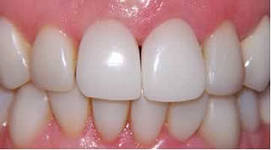
Plastic dentures are made of acrylic.
In dentistry, acrylic dentures are very popular, because they are suitable for people of different ages.
Plastic constructions are used with partial or complete absence of teeth.
Types of prostheses made of plastic
Plastic prostheses (see photo) can be:
- Injected and pressed.
- Removable and non-removable.
- Permanent and temporary.
Injected and pressed plastic constructions
- A pressed prosthesis is easier to manufacture, but, in quality, such a design is inferior to an injection prosthesis.
- Injection molded plastic prostheses fit the jaws with very high precision. This construction technique allows you to simulate the structure of the oral mucosa so that the denture is almost impossible to distinguish from real teeth.
Removable and non-removable plastic prostheses
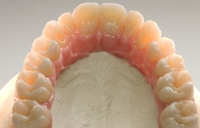
Most often, removable dentures for teeth are made of plastic. Removable dentures are plastic, can be used both with partial or complete absence thereof.
If the teeth are completely absent, then the prosthesis rests only on the gum and its fixation is due to the effect of suction. Plastic prostheses used in the partial absence of teeth have a clasp made of wire that go from the base of the structure and cover the abutment teeth.
Partial plastic dentures can be attached using invisible attachments - attachments. In the absence of one or two teeth, a butterfly prosthesis can be used.
Fixed structures are very rarely made of plastic, because they require very strong grinding of teeth.
Indications and contraindications
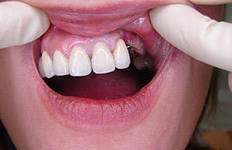
Indications for the use of dental prostheses made of plastic:
- As temporary prostheses (crowns, plastic bridges)
- Tooth defects.
- Deformation of the front teeth.
- Lack of one or more teeth.
- For periodontal disease - as a splint design.
Contraindications to the installation of plastic prostheses:
- Allergy to acrylic.
- Short crown of the prosthetic tooth.
- Increased tooth abrasion.
- Malocclusion.
- Loose teeth.
Pros and Cons of Plastic Dentures
Plastic dentures have the following advantages:
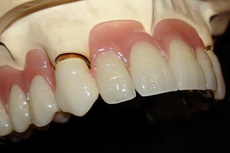
- Can be used as temporary plastic dentures.
- Affordable for the price.
- Good aesthetic qualities: lack of gloss, resemblance to the shade of natural teeth.
Disadvantages of plastic prostheses:
- Quick wear - one year after installation, the appearance of the prosthesis worsens.
- Irritation of the mucous membrane of the gums.
- May cause an allergic reaction.
- Particles of food may accumulate under the tooth crown some time after installation.
- When wearing plastic prostheses, pain in the mandibular joint, a feeling of discomfort, and headache can be observed.
But, despite the fact that plastic prostheses have both pros and cons, their popularity is high. This is explained by the fact that it is better to have a prosthesis of poor quality than a toothless mouth.
Care and storage
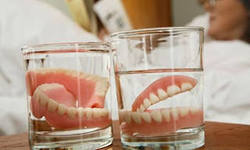
- Plastic denture care is the same as dental care.
- Removable dentures must be removed at least twice a day in order to carry out hygienic cleaning using a toothbrush with paste.
- After each meal, the structure is removed, rinsed well with water.
- When using a removable denture, it is not recommended to eat viscous and sticky products.
- To quickly get used to the prosthesis, the first time after installation, it is better not to remove the structure before bedtime.
- Keep plastic prostheses dry.
- To care for removable dentures, special tools must be used. which are available in the form of powders and tablets. When the tablet is dissolved in water, a liquid is obtained that is suitable for disinfection, as well as the removal of food debris and pigmented plaque from the denture.
Video: Artificial teeth. How it works.
Life time
The service life of plastic prostheses is about two years.
- To increase the service life of such structures, dentists are trying to combine plastic with metal. Such dentures can last 5 years or more.
- Plastic cladding that has fallen off the metal can be applied again directly in the mouth. To do this, do not remove the metal base.
With proper oral hygiene, the structure lasts longer.
Repairs
Dentists do not recommend using a removable laminar denture made of plastic for a long time.
Repair of a plastic denture may be required due to the fact that:
- The wire clasp loses its elasticity after only one - two months and just hangs on the supporting teeth.
- Chewing tubercles and then the body of an artificial tooth are erased very quickly.
- Crowns made of acrylic plastic for prostheses change color, quickly wear out in contact areas and break.
Plastic prosthesis prices
| Type of prosthesis | Prosthesis price (in rubles) |
| Partial removable laminar denture (imported teeth) up to 6 teeth | 16000 |
| Full metal denture removable denture | 39000 |
| Temporary removable denture prosthetics | 19000 |
| Complete removable acrylic prosthesis | 7000 |
| Partial denture | 5500 |
Before and after photos
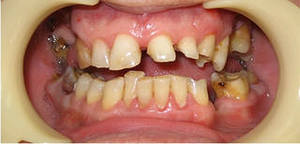 |
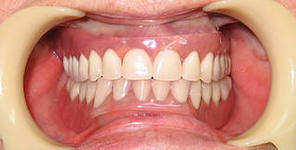 |
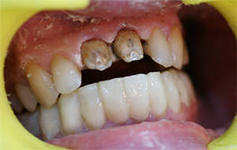 |
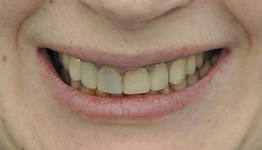 |
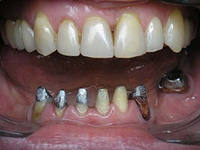 |
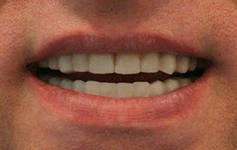 |
FAQ
- Question: How to store a removable denture?
Answer: Plastic prostheses: Clasp, acrylic should be stored in a dry, closed container
- Question: What materials make the basis of a removable denture?
Answer: Acrylic plastic, nylon metal and such modern materials as valplast and flexite can serve as the material for the manufacture of the basis.
- Question: How to whiten plastic dentures?
Answer: Using special tools that you can buy at the pharmacy.
- Question: How to clean plastic dentures?
Answer: It is necessary to clean the structure with a soft toothbrush with paste.
- Question: What are the cheapest dentures?
Answer: The cheapest are plastic dentures, the price of which is from 2500 rubles.
